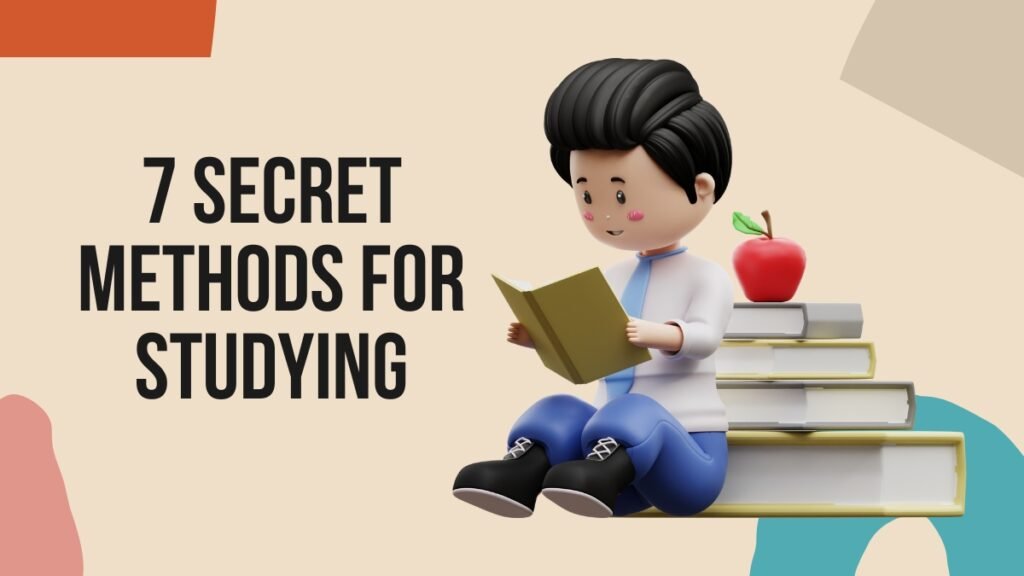Uncover 7 secret methods for studying to enhance your learning, improve focus, and remember more effectively. Transform your study routine and excel in exams with these insider tips!
Fed up with endless nights buried in textbooks? Ever feel like you’re just not retaining anything? Well, there’s a better way! Dive into these 7 powerful study methods that will transform how you learn, boost your focus, and help you remember more.
Say goodbye to cramming and hello to acing those exams—and impressing your teachers along the way—with these insider study hacks!
Understanding the Challenges
Learning English has its challenges:
Internal Challenges
- Vocabulary: Learning lots of new words takes time.
- Grammar: Understanding English grammar is complex.
- Listening: Understanding different accents can be hard.
- Speaking: Feeling confident and avoiding mistakes is tough.
- Reading: Understanding complex texts slows reading down.
- Writing: Writing clearly and correctly is a skill to develop.
Psychological Barriers
- Fear of Mistakes: Fear can hold back learning.
- Lack of Confidence: Confidence affects engagement.
- Speaking Anxiety: Anxiety can make speaking harder.
External Factors
- Limited Exposure: Few chances to practice English daily.
- Few Practice Partners: Hard to find people to practice speaking with.
- Lack of Resources: Limited access to good learning materials and teachers.
- Knowing these challenges helps us plan effective ways to learn English successfully.
7 secret methods for studying
Check out 7 secret methods for studying:-
Method 1: Immersive Learning
This approach surrounds you with the language naturally and engagingly.
What is Immersive Learning and Why is it Important?
- Immersive learning keeps you constantly exposed to English, making learning more intuitive and effective.
- Think of it like soaking up the language effortlessly!
- Compared to traditional methods, immersion can significantly speed up your progress.
Techniques for Your English Journey
- Surround Yourself with English Media: Watch movies, listen to music and podcasts—all in English! Start with subtitles, then transition to none.
- Engage in Daily English Conversations: Chat with partners online or locally. Embrace mistakes as learning moments!
- Participate in English Community Events: Join workshops, meetups, or online forums where English is spoken. This boosts speaking practice and connects you with other learners.
Benefits of Immersion
- Faster Language Acquisition: Exposure to English accelerates learning.
- Improved Listening and Speaking Skills: Immerse yourself in English’s sounds and rhythms.
- Better Cultural Understanding: Language and culture go hand in hand. Immersion deepens appreciation for English-speaking cultures.
Real-Life Example: Success Through Immersion
- Meet [Student Name], who mastered English through immersion:
- Initial challenges with English.
- Strategies used (e.g., joining online groups, watching English media).
- Achievements (e.g., fluent conversations, confident writing).
- [Student Name]’s journey shows how immersion can unlock fluent communication and achieve English language goals.
Method 2: Utilizing Technology
In today’s digital world, language learning is all about technology!
Exploring Language Apps
- Duolingo: Fun, bite-sized lessons with rewards.
- Babbel: Focuses on practical conversation skills.
- Rosetta Stone: Emphasizes immersion through visuals.
Beyond Apps: Your Digital Toolbox
Explore online courses from:
- Coursera: Top university courses.
- Udemy: Affordable options for all levels.
- Khan Academy: Free, high-quality resources.
Benefits of Embracing Technology:
- Personalized Learning: Tailor your learning to your goals.
- Interactive Content: Games and quizzes keep learning fun.
- Flexibility: Learn anytime, anywhere.
Expert Insights: The Rise of AI
We talked with an expert about AI’s impact:
“[Quote from Expert on AI’s benefits in language learning],” says [Expert Name].
Future Technology
- Look forward to:
- Advanced AI tutors: Personalized feedback and learning paths.
- VR experiences: Realistic language practice.
- AR tools: Interactive learning in real-world settings.
By using tech in your learning journey, you’ll find personalized opportunities, stay engaged, and reach fluency faster.
Method 3: Consistent Practice and Revision
Check out methiod 3:-
Importance of Regular Practice
- Daily Language Exercises: Quick tasks every day to reinforce learning.
- Vocabulary Drills: Regular practice to expand your word bank.
- Grammar Quizzes: Test yourself on rules and structures.
- Reading Comprehension Tests: Improve understanding of written texts.
Weekly Review Sessions
- Summarize Key Concepts: Review important language points.
- Practicing Weak Areas: Focus on challenging parts to improve.
Tools for Effective Practice
- Language Workbooks: Structured practice for systematic learning.
- Flashcards: Use for vocabulary and grammar reinforcement.
- Online Forums and Study Groups: Join to discuss and practice with others.
- Consistent practice with these tools will boost your language skills and confidence.
Method 4: Engaging in Active Reading
Transform from passive to active reading for deeper understanding and better learning.
Strategies
- Skimming and Scanning: Quickly find key points.
- Identifying Key Ideas: Discover the main message and themes.
- Annotating and Highlighting: Take notes and mark important parts.
Fueling Your Reading
Explore different types of material
- Classic Literature: Rich vocabulary and timeless themes.
- Academic Journals: Expand knowledge and encounter advanced language.
- News Articles: Stay informed and practice factual reading.
Benefits
- Improved Comprehension: Understand the text deeply.
- Enhanced Critical Thinking: Analyze and form opinions.
- Vocabulary Growth: Learn new words in context.
Transformation Example
- Meet [Student Name], who improved their English skills:
- Overcame comprehension challenges.
- Used active reading strategies (e.g., summarizing, making mind maps).
- Achieved success in understanding complex texts and discussing literature confidently.
- Active reading enhances understanding and boosts English proficiency effectively.
Method 5: Enhancing Listening Skills
Master listening for better communication in English.
Why Listening Matters
- Engage in conversations: Understand and respond naturally.
- Develop pronunciation: Learn to mimic natural English sounds.
- Expand vocabulary: Discover new words in context.
Sharpen Your Skills
- Podcasts and Audiobooks: Listen to topics of interest at different speeds.
- Movies and TV Shows with Subtitles: Start with native subtitles, then switch to English.
- Webinars and Online Discussions: Join live events to hear real conversations.
Tools for Better Listening
- Spotify for Language Learning: Curated playlists with podcasts and audiobooks.
- TED Talks: Engaging talks on various subjects in clear English.
- BBC Learning English: Audio lessons and exercises to improve listening.
Success Story
- Meet [Student Name], who improved by:
- Overcoming challenges with native speakers and fast conversations.
- Using keywords, context clues, and practicing dictation.
- Feeling confident in discussions and understanding lectures.
- Practice active listening to break barriers and enhance your English skills effectively.
Method 6: Developing Writing Proficiency
- Transform your writing from basic to brilliant with these steps:
- Daily Journaling: Write regularly to explore ideas and refine your style.
- Embrace Different Forms: Practice writing essays, reports, or start a blog in English.
Improve Your Skills
- Grammar and Punctuation: Master basics for clear writing.
- Sentence Structure: Add variety and clarity.
- Active Voice: Use it for more impact.
Tools for Better Writing
- Grammarly: Corrects grammar, punctuation, and style.
- Hemingway Editor: Improves clarity and conciseness.
- Writing Workshops: Join for feedback and improvement.
Expert Advice
“[Quote from Writer Name about seeking feedback and continuous learning in writing],” says [Writer Name].
Effective Writing Habits
- Seek Feedback: It’s crucial for improvement.
- Keep Learning: Explore new styles and adapt.
Follow these steps, use tools, and stay open to learning to enhance your writing skills in English.
Method 7: Joining Study Groups and Language Exchange Programs
Explore the benefits and steps to join study groups and language exchanges.
Benefits of Group Study
- Collaborative Learning: Learn together and share knowledge.
- Different Perspectives: Gain insights from diverse viewpoints.
- Mutual Support: Stay motivated and help each other succeed.
How to Find and Join Groups
- Bulletin Boards: Check university and community postings.
- Online Platforms: Join language learning groups on social media.
- Language Websites: Explore forums dedicated to language study.
Language Exchange Programs
How They Work
- Pairing Partners: Find someone to practice languages with.
- Benefits: Improve speaking skills and cultural understanding.
- Finding a Partner: Look for someone with similar language goals.
Success Story
- Challenges: Overcome difficulties in group settings.
- Activities: Engage in collaborative learning.
- Achievements: Improve communication and study techniques.
Joining study groups and language exchanges enhances learning and proficiency effectively.
7 Secret Methods for Studying for Exams
Feeling overwhelmed by textbooks and another late-night study session? There’s a better way! These 7 methods will boost your studying, focus, and exam performance:
| Study Method | Description |
|---|---|
| Immerse Yourself in English | Surround yourself with English through movies, music, and conversations for natural learning. |
| Use Tech Tools | Utilize apps like Duolingo, Babbel, and online courses on platforms like Coursera and Udemy. |
| Active Reading | Engage actively with texts by skimming, highlighting, and annotating for better comprehension. |
| Sharpen Listening Skills | Improve listening comprehension with podcasts, audiobooks, and movies/TV shows with subtitles. |
| Develop Writing | Enhance writing skills through daily journaling, essay writing, and tools like Grammarly. |
| Join Study Groups and Exchanges | Collaborate with study groups and language exchange programs for practice and motivation. |
| Enjoy the Journey | Set goals, celebrate progress, and make learning enjoyable and rewarding. |
Transform your studying into success with these simple, effective methods.
7 Secret Methods for Studying for Exams PDF Free Download
7 secret methods for studying pdf free download:-
What is the 2/3,5/7 study method?
The 2/3, 5/7 method isn’t widely recognized for exams but seems geared toward spaced repetition in memorization.
Spaced repetition involves reviewing info at increasing intervals to strengthen memory. The 2/3, 5/7 method might structure this as:
- Learn info initially. (Day 1)
- Review shortly after. (Day 2 or 3)
- Longer interval review. (Day 5)
- Final review before the exam. (Day 7)
It’s speculative, lacking a clear online explanation.
In contrast, your 7 secret methods cover diverse study strategies for language learning and exam prep, focusing on active learning, engagement, spaced repetition (e.g., active reading, practice exercises), and collaboration – all effective for retention and exam success.
How can I focus 100% on studying?
Achieving total focus while studying is tough, but realistic breaks are crucial. Maximize your focus with these tips:
Optimize Your Space
- Create a tidy, well-lit study area.
- Silence distractions and avoid interruptions.
Plan Effectively
- Schedule study sessions in advance.
- Break tasks into manageable goals.
Use Focus Techniques
- Try the Pomodoro Technique (25-minute work intervals).
- Remove major distractions during study time.
Boost Energy
- Get enough sleep and eat well.
- Take short breaks to recharge.
Stay Engaged
- Actively take notes or practice problems.
- Reward yourself for meeting study goals.
Improving focus takes practice. Experiment with these tips to find what works best for you.
What is the 2357 study method?
The 2357 study method is a spaced repetition technique for better exam preparation. Here’s how to use it effectively:
Mark Your Exam Date: Note your exam date on a calendar.
Schedule Review Sessions: Plan sessions leading up to your exam:
- 2 days before
- 3 days before
- 5 days before
- 7 days before
Review Material: During each session, review your notes, practice problems, or summarize key concepts.
Benefits of the 2357 Method
- Fights Forgetting: Regular reviews combat the forgetting curve.
- Strengthens Memory: Repeated exposure helps cement information in your memory.
- Time Management: Provides a structured study schedule.
Considerations
- Adjust Intervals: Modify intervals based on material difficulty and your learning style.
- Personalize: Add more sessions or extend intervals as needed.
- Combine Techniques: Pair with active learning and practice tests for best results.
Integrate the 2357 method into your study routine to boost memory retention and confidence in your exam readiness!
What is the best method to study?
Effective studying depends on your learning style, the subject, and the exam format. Here’s how to choose and use study methods:
Study Techniques
- Active Learning: Take notes, make diagrams, solve problems, and discuss with peers.
- Spaced Repetition: Review material at increasing intervals using methods like 2357 or flashcards.
- Retrieval Practice: Test yourself with quizzes or explain concepts to others.
- Interleaving: Mix topics to understand connections better.
- Mnemonic Devices: Use tricks like acronyms or rhymes for memory.
Choosing the Right Method
- Consider Your Style: Adjust methods for visual, auditory, or kinesthetic learning.
- Subject Specificity: Match methods to each subject’s needs (e.g., problem-solving for math, timelines for history).
- Exam Format: Prepare differently for multiple-choice versus essay exams.
Maximize Study Time
- Create a Good Space: Reduce distractions for focused study.
- Set Goals: Break tasks into smaller, achievable parts.
- Take Breaks: Rest to help retain information and avoid burnout.
- Get Help: Ask teachers, tutors, or peers for support when needed.
Experiment to find what works best for you and adapt as you go for effective learning and exam success.
Conclusion
So, to sum it all up, these 7 study methods are like your secret weapons for acing your studies. Whether you’re diving into immersive learning or using tech tools, honing your listening and writing skills, each one helps you study smarter and reach your academic goals.
Whether it’s learning new subjects or getting ready for exams, these methods will guide you toward success. Embrace them, find your groove, and enjoy the journey of mastering new knowledge and skills!


